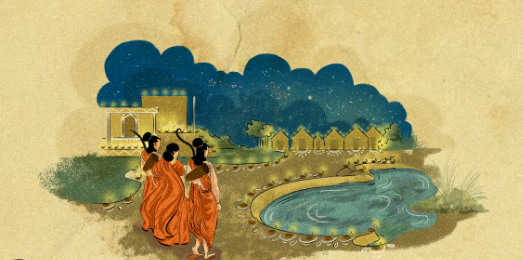- This topic has 0 replies, 1 voice, and was last updated by .
-
AuthorPosts
-
November 12, 2023 at 7:50 am #1517Up::0
One of the most popular Hindu holidays is Diwali, which is celebrated in October or November each year. Hindu mythology offers several stories that explain the meaning of Diwali celebrations. A noteworthy story concerns the spiritual meaning of Diwali. According to this narrative, Diwali recalls the return of Lord Rama, Sita, and Lakshmana to Ayodhya following their victory over the Lankan evil king Ravana. To welcome Lord Rama and commemorate the triumph of good over evil, people lit earthen lamps and diyas. This illustrates how virtue and wisdom always prevail over evil. A different spiritual story celebrates God Krishna’s victory over the evil Narakasura.People of Mathura celebrated by lighting earthen lamps, as a victory of good over evil. In the western states of India, Diwali is mainly celebrated as the day Krishna defeated Narakasura, thereby displaying the divinity of Krishna and the significance of good always emerging victorious over evil.
Significance of Diwali
Triumph of Light Over Darkness: Diwali represents the victory of good over evil and light over darkness. A potent emblem of this victory is the tale of Lord Rama’s return to Ayodhya following his victory over the demon king Ravana. During Diwali, lighting lamps and candles symbolize the triumph of virtue and knowledge over ignorance.
Religious Observance: Diwali is a very sacred holiday for Hindus. It’s an occasion to worship the gods, particularly the goddess of wealth and prosperity, Goddess Lakshmi. People think they can bring money and good fortune into their houses on Diwali by doing puja and asking for blessings.
Harvest Festival: Diwali is observed as a harvest festival in several regions of India, signifying the conclusion of the
5-day CelebrationThe darkest night of the Indian lunisolar month of Kartik, which falls in late autumn following Vijaya-Dashami or Dussehra, falls on the day of Diwali. The five-day celebration of Diwali in India starts on the thirteenth day of the moon with Dhanteras. On the fourteenth day, people celebrate Naraka Chaturdashi, also known as Bhoot Chaturdashi. On this day, Lord Krishna vanquished the demon king Narakasur and freed 16,000 ladies who were imprisoned, signifying the triumph of good over evil. The climax comes on the fifteenth day of the moon, also known as the new moon day, in the month of Kartik. On this day, we celebrate Diwali. The next day is the Govardhan Puja divas and the 5th day is Bhatri Dwitiya or Bhai Dooj, a day to celebrate the bond between brothers and sisters.
This five-day period is therefore a great celebration.
Dhanteras: This day is devoted to housecleaning and getting ready for the forthcoming Diwali celebrations, which frequently entails going shopping. In addition, it is a day for worshiping Goddess Lakshmi and buying gold or precious items is common.
Naraka Chaturdasi: This day honors the conquest of the demon deity Narakasura by Lord Krishna. People prepare for the holidays by hanging lights, decorating, and entertaining.
Diwali: An even more elaborate ceremony honoring Goddess Lakshmi is held on the day dedicated to Diwali. It entails deep cleaning, making elaborate rangoli patterns, burning oil lamps (diyas), getting together with family, giving and receiving presents, sharing candies, and praying to Goddess Lakshmi.
Padwa: On this day, people celebrate Lord Krishna’s achievement of lifting the massive Govardhan Mountain to shield his people from the fury of Lord Indra.

Diwali is celebrated with worship, sharing sweets, fireworks and lights. While the story varies from region to region, its essence remains the same. People learn to rejoice in the inner light and the underlying reality of things.
Attachments:
You must be logged in to view attached files. -
AuthorPosts
- You must be logged in to reply to this topic.